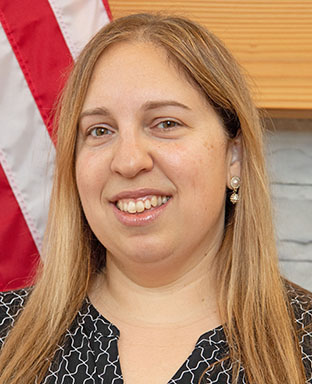Veterans with head and neck cancers experience difficult health challenges. These include acute pain, dietary restrictions, voice or appearance changes and mental health issues.
But Veterans enrolled in care at Lebanon VA in Pennsylvania don’t have to face those challenges alone. And that’s thanks to a virtual support group established by Dr. Melissa Cyrus.
Cyrus is a psychologist who serves as the system’s director of clinical training for geriatric mental health. As part of the outpatient palliative care team, she works to improve the quality of life and comfort of Veterans with severe illnesses.

The team meets weekly to discuss different aspects of caring for the Veterans they serve. That’s where Cyrus learned about the challenges faced by Veterans with head or neck cancer. They are unlike the challenges of Veterans with other cancers.
Unique challenges for Veterans with head or neck cancers
“With a lot of cancers comes the symptom of pain,” Cyrus said. “But head and neck cancers are known to be especially challenging with pain, really off-the-charts pain and have a very difficult pain management regimen.”
Changes in the face or voice can hit hard at a Veteran’s self-esteem. And dietary issues can make social situations tough, she learned. For those who must rely on a feeding tube, the pleasure of tasting food is gone, and that can cause depression.
“Even just being invited to a barbecue and having specific dietary needs due to having a choking risk, is really challenging to navigate,” she said.
The palliative care team recognized that these Veterans could use a support group to help with their unique challenges. The palliative care and treatment teams identified potential group members. The Veteran participants are still identified that way whether they are new to treatment or have run into new complications or challenge.
Virtual support group uses VA Video Connect
For the past few years, the small group of Veterans has gathered for an hour twice a month. The group meets using VA Video Connect, VA’s secure videoconferencing app. Typically, Cyrus talks with the group about psychological concerns at one of the monthly meetings. For the other meeting, another member of the palliative care team leads a discussion about other concerns.
At a recent meeting, a pharmacist discussed pain medications and management. Other presenters have included a chaplain, a nurse care coordinator, a nurse practitioner, a dietician and a speech pathologist.
Cyrus’ group is made up of Veterans from Lebanon VA. She would consider adding participants from other regions if there is a need. That wouldn’t be possible without the virtual meetings. That option has enabled Veterans to take part from anywhere, despite whatever obstacles or limitations they may face, such as transportation to the facility.
And meeting virtually has not stopped the group from developing camaraderie. Some of the founding members are still faithful participants and they’ve started mentoring newer Veterans in the group. One of the founding members of the group enjoys traveling. But he never fails to call in for meetings, no matter where he is.
“They’ve been such a cohesive group even though it’s been virtual,” Cyrus said. “They may have not been able to have that supportive connectedness without the VA Video Connect platform.”
Learn more about VA Video Connect.
Author:
